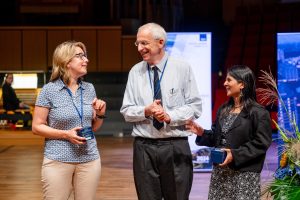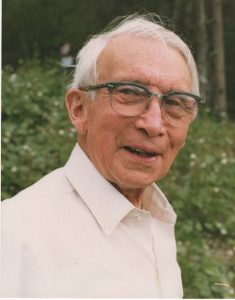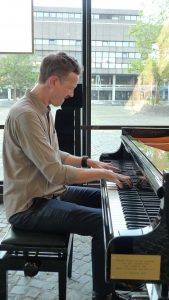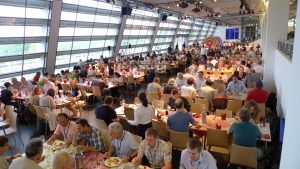Herold Dehling, the Chair of the Local Organizing Committee for the World Congress, writes:
The Bernoulli–IMS 11th World Congress in Probability and Statistics was held from 12 to 16 August, 2024, on the campus of Ruhr University Bochum, Germany. Organized jointly by the Bernoulli Society for Mathematical Statistics and Probability, and the Institute of Mathematical Statistics, the congress stood in the tradition of the previous World Congresses, held in Tashkent (1986), Uppsala (1990), Chapel Hill (1994), Vienna (1996), Guanajuato (2000), Barcelona (2004), Singapore (2008), Istanbul (2012), Toronto (2016) and Seoul (2021, virtual). The 2024 World Congress was attended by 933 participants from around the world, making it the best attended world congress since the 1986 Tashkent World Congress. The participants came from 50 different countries: about 25% from Germany, many from nearby European countries, but also 20% from the US and Canada, sizable numbers from Asia, Australia and New Zealand, with also some representation from Central and South America, as well as from Africa.

Program co-chairs Aurore Delaigle and Kavita Ramanan, with Local Organizing Chair Herold Dehling. Photo copyright © RUB, Marquard.
The international scientific programme committee was chaired by Aurore Delaigle (University of Melbourne) and Kavita Ramanan (Brown University). Further members of the SPC were Sudipto Banerjee (University of California, Los Angeles), Riddhipratim Basu (Tata Institute of Fundamental Research, Bangalore), Krzysztof Bogdan (Wroclaw University of Science and Technology), Holger Dette (Ruhr University Bochum), Hugo Duminil-Copin (University of Geneva), Alice Guionnet (ENS Lyons), Ruth Heller (Tel Aviv University), Nina Holden (New York University), Regina Liu (Rutgers University), Ramsés H. Mena (Universidad Nacional Autonoma de México), Andrea Montanari (Stanford University), Johanna Nešlehová (McGill University), Sofia Olhede (EPFL), Roberto Oliveira (IMPA, Rio de Janeiro), Mariana Olvera-Cravioto (University of North Carolina, Chapel Hill), Valentin Patilea (ENSAI, Bruz), Sarah Penington (University of Bath), Annie Qu (University of California at Irvine), Gareth Roberts (University of Warwick), Janice Scealy (Australian National University), Stijn Vansteeland (Ghent University), Valeria Vitelli (University of Oslo), Hendrik Weber (University of Münster), Song Xi Chen (Peking University), and Thaleia Zaripophoulou (University of Texas at Austin).
Members of the local organizing committee were Axel Bücher, Herold Dehling (Chair), Holger Dette, Peter Eichelsbacher, Roland Fried, Christof Külske, Christoph Thäle, Anita Winter, and Jeannette Woerner. The local organizing committee was assisted by a professional conference organizer, as well as by a team of more than 30 volunteers (staff members, PhD students, and postdocs) from Ruhr University Bochum and the neighboring universities of Dortmund and Duisburg–Essen.
During the opening ceremony on Monday morning, led by LOC co-chair Peter Eichelsbacher, the conference participants were welcomed by Günter Meschke (Vice-rector of Research, Ruhr University Bochum), Gerd Laures (Dean of the Faculty of Mathematics, Ruhr University Bochum), Claudia Kirch (spokesperson for the Probability and Statistics Group of the German Mathematical Society [see here for more about this group]), Victor Panaretos (BS President), Michael Kosorok (IMS President) and by SPC Chairs Aurore Delaigle and Kavita Ramanan. The LOC chair Herold Dehling read greetings sent by Klaus Krickeberg, former president of the Bernoulli Society and chair of the Scientific Programme Committee of the First World Congress in Probability and Statistics held in 1986 in Tashkent.
The 11th Bernoulli–IMS World Congress had an impressive scientific programme. Highlights were the plenary lectures:
- Mihaela van der Schaar (Cambridge University), Tukey Lecture: The (Causal) Discovery Ladder: Unravelling Governing Equations and Beyond using Machine Learning
- Pablo A. Ferrari (University of Buenos Aires), Doob Lecture: Soliton Decomposition of the Box-Ball System and the Pitman Transformation
- Marc Hallin (Université Libre de Bruxelles), Medallion Lecture: Ancillarity, Maximal Ancillarity, and Semiparametric Efficiency
- Emmanuel Candès (Stanford University), Bernoulli Lecture: Frontiers in conformal and model-free inference
- Xihong Lin (Harvard T.H. Chan School of Public Health), Laplace Lecture: Empower an End-to-End Scalable and Interpretable Data Science Ecosytem by Integrating Statistics, AI, and Domain Sciences
- Peter Bühlmann (ETH Zürich), Wald Lecture: Causality-Inspired Statistical Machine Learning
- Rafal Latala (University of Warsaw), Kolmogorov Lecture: Upper and Lower Bounds for Moments and Tails of Real and Vector-Valued Random Chaoses
- Chunming Zhang (University of Wisconsin–Madison), Medallion Lecture: Learning Network-Structured Dependence from Multidimensional Temporal Point Processes
- Rongfeng Sun (National University of Singapore), Lévy Lecture: The Critical 2D Stochastic Heat Flow: Disordered System Meets Singular SPDE
- Nina Holden (New York University), 2024 Schramm Lecture: Scaling Limits of Random Planar Maps
- Moulinath Banerjee (University of Michigan), Medallion Lecture: Estimation and Inference for the Average Treatment Effect in a Score-Explained Heterogeneous Treatment Effect Model
- Frank den Hollander (Leiden University), Ising Lecture: Evolution of Discordance [see below for more about the Ising Lecture]
- Victor Chernozhukov (MIT), Cox Lecture: Long Story Short: Omitted Variables Bias in Causal Machine Learning
- Remco van der Hofstad (Eindhoven University of Technology), Medallion Lecture: Critical Percolation on Scale-Free Random Graphs
- Patricia Gonçalves (IST Lisbon), 2023 Schramm Lecture: Hydrodynamics, Fluctuations, and Universality of Exclusion Processes

Ernst (Ernest) Ising (1900–1998). Photo by Thomas Ising.
Special to the 2024 World Congress was the Ising Lecture, organized by the Ruhr University Mathematics Department in memory of Ernst Ising (1900–1998), who spent most of his childhood and youth in Bochum. Born in Cologne, Ising moved in 1904 with his parents to Bochum, where he graduated from high school in 1918. In his 1924 PhD thesis, written under the supervision of Wilhelm Lenz at the University of Hamburg, Ernst Ising analyzed the model for ferromagnetism that nowadays bears his name. Speaking as chair of the Ising Lecture, Herold Dehling commemorated the fate of the Ising family and other Jewish families in Bochum during the Nazi period.
Most talks were given in one of the parallel sessions, arranged during 10 time slots with 17 sessions each. 149 invited talks were given in 49 invited paper sessions, devoted to a wide range of topics of strong current research interest in probability, statistics, and the interface between them. The topics and the organizers of the invited paper sessions had been selected by the scientific programme committee. A call for proposals resulted in 55 organized contributed paper sessions with a total of 214 talks. In addition, 242 individual contributed talks were presented, as well as 108 posters, making a total of 728 scientific presentations.
The campus of Ruhr University Bochum provided superb facilities for the World Congress. Plenary talks were delivered in the Audimax, Germany’s largest lecture hall, having a seating capacity of 1700. Coffee breaks, the welcome reception, the poster session, and book exhibits took place in the foyer of the Audimax. Parallel sessions were held in two nearby buildings which offered enough rooms for 17 parallel sessions at any time. Lunch was served in the Mensa of Ruhr University, in a building adjacent to the Audimax.

Benedikt Jahnel, TU Braunschweig, played the piano at the Welcome Reception
There was a broad social program during the world congress, to which many people contributed in various ways. More than 200 participants took the chance to avoid long queues by pre-registering on the Sunday afternoon in the cafe of a downtown Bochum church, which also gave a chance for a first social gathering with coffee, tea, and home-baked cake. During the opening ceremony on the Monday morning, Christof Külske played the organ in the Audimax. Monday evening saw the IMS Presidential Address and Awards Ceremony, followed by the Welcome Reception, with piano music by Benedikt Jahnel, TU Braunschweig. On the Tuesday evening, the Bernoulli Society, as part of its annual General Assembly, celebrated its 50th anniversary, followed by a reception in the foyer of the Audimax. On Wednesday evening, the conference dinner took place in the Mensa building of Ruhr University Bochum. In addition, several smaller excursions were organized, such as to the picturesque old town of Hattingen, and to the Zeche Zollverein, a UNESCO World Heritage Site that once was home to the world’s largest coal mine.
The Bernoulli–IMS 11th World Congress was financially supported by grants from the German Science Foundation DFG, by Ruhr University Bochum, by the Stochastics Section of the German Mathematical Society, as well as by the Bernoulli Society, and the Institute of Mathematical Statistics. The generous support from these organizations made it possible to keep the conference fees at a modest level (300 EUR for members of BS or IMS, 350 EUR regular fee, 200 EUR reduced fee). The conference fee included unlimited use of local public transport, and also access to the social gatherings, including Wednesday night’s conference dinner.

The conference dinner, attended by more than 800 participants, had a lively atmosphere
As a result, the conference dinner was attended by more than 800 conference participants, creating a very lively atmosphere for social interaction. Thanks to the generous support from various sponsors, daycare could be provided at modest cost for the participants (50 EUR per day), allowing parents to bring their children to the congress.
Participants unanimously agreed that the 11th Bernoulli–IMS World Congress in Probability and Statistics was a great success. Many factors contributed to this. The excellent quality of the scientific programme offered a chance to get an impression of latest developments at the forefront of research on a wide spectrum of topics in probability and statistics. The superb local facilities on the campus of Ruhr University Bochum fostered exchange among the participants. The participants brought a contagious enthusiasm for their latest research, and enjoyed the chance to share their ideas. Not to forget the hard and dedicated work of the local organizing committee, the scientific programme committee, and the many helping hands on campus. The participants could also feel the good spirit among all who were involved in the organization, and the joy that they shared in their work.